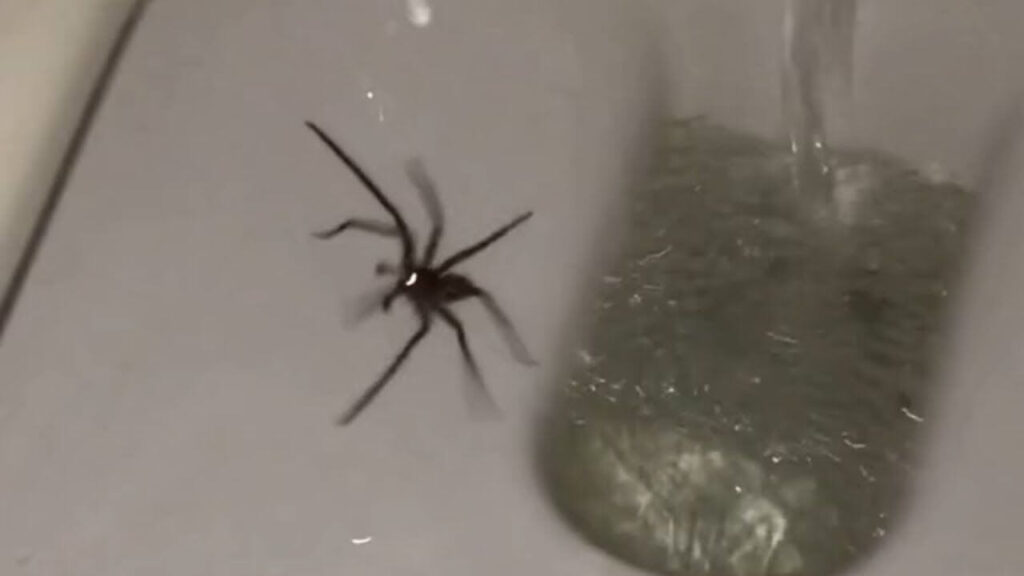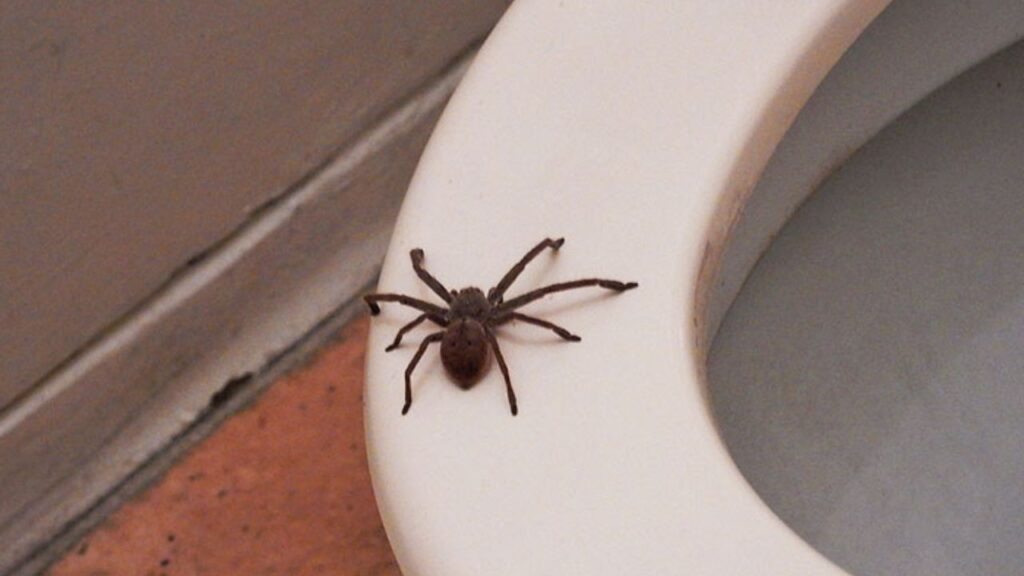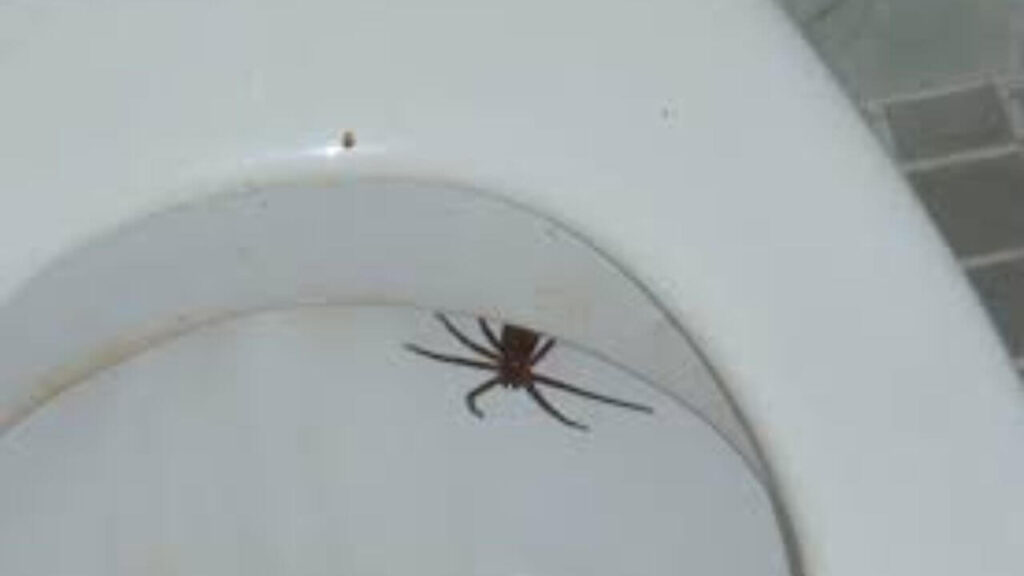Ah, the age-old dilemma of encountering a spider in the house – to confront it head-on or opt for the quick and straightforward solution: flushing it down the toilet.
I remember the first time I tried this, thinking it was a foolproof method to bid farewell to my eight-legged intruder.
Little did I know what happens when a spider meets the watery vortex. Join me on this enlightening journey as we uncover the surprising fate of flushing a spider.
From underwater survival tactics to the potential repercussions, let’s delve into the world of arachnids and their aquatic adventure down the drain.
Is It Okay To Flush A Spider Down The Toilet?

Well, I must emphasize that it is not recommended to flush a spider down the toilet or use harmful methods to handle them.
Treating all living creatures with respect and compassion is essential, even if they may be considered pests or frightening to some individuals.
There are several reasons why flushing a spider down the toilet is not advisable:
1. Inhumane Treatment
Flushing a spider down the toilet is a harsh and inhumane method of handling these creatures.
Spiders are living beings, and subjecting them to drowning is an unnecessary act of cruelty.
Like all living creatures, they deserve to be treated with respect and compassion.
2. Environmental Impact
Spiders are an essential part of the ecosystem and are crucial in controlling insect populations. They help keep the balance in check by preying on various pests.
By flushing spiders down the toilet, we disrupt this natural balance, potentially increasing insect populations and ecological imbalances.
3. Plumbing Issues
The size and shape of spiders may vary, and not all spiders will quickly go down the drain.
Flushing a too-giant spider could lead to clogs or other plumbing problems, which can be costly and inconvenient.
4. Public Health Concerns
If the spider is not thoroughly flushed away and remains in the pipes or septic system, it could create a health hazard.
In rare cases, the spider might find its way back into your living space, posing risks to residents, especially those with arachnophobia or allergies to spider bites.
Also Read:
Is It Okay To Flush Pubic Hair Down The Toilet
Can You Flush A Scorpion Down The Toilet
Can You Flush Lint Down The Toilet | Calm Your Curiosity
Can Spiders Come Up Through The Toilet?

Spiders can come up through the toilet, but it is relatively rare.
Spiders are small, agile creatures that can crawl through openings and crevices, including plumbing pipes.
While it is not a common occurrence, there have been instances where spiders have been found in toilets or bathrooms. Here’s an explanation of how this can happen:
1. Drain Pipes and Sewer Systems
Spiders can find their way into the plumbing system through tiny openings in drain pipes, vent pipes, or sewer lines.
These openings can occur due to wear and tear, poor construction, or damaged seals around plumbing fixtures.
Spiders that enter the plumbing system may accidentally end up in toilets or bathroom sinks as they explore the dark and confined spaces.
2. Climbing Abilities
Certain species of spiders possess remarkable climbing abilities, allowing them to scale vertical surfaces quickly.
These agile climbers can crawl up walls and pipes and even navigate through narrow spaces, allowing them to enter toilets through the plumbing system.
Sometimes, they may crawl under the toilet rim or through small openings near the base.
3. Seeking Moisture and Prey
Spiders are attracted to moisture-rich environments, and bathrooms offer an ideal habitat for them.
The presence of water, humidity, and condensation in bathrooms makes them appealing places for certain spider species to seek shelter.
Additionally, insects or other small organisms that serve as prey can draw spiders into the bathroom.
4. Accidental Entry
Spiders may accidentally end up crawling around the house in toilets or bathrooms. They can fall from ceilings, walls, or objects and inadvertently find themselves in the bowl.
Once inside the smooth and slippery toilet bowl, some spiders may struggle to climb out due to the lack of footholds.
While most spiders are harmless and beneficial as they help control insect populations, some species can be vicious and potentially dangerous to humans.
It is crucial to be aware of the types of spiders in your region and to exercise caution when encountering unfamiliar ones.
Also Read:
Can You Flush Glass Down The Toilet
Can You Flush Hair Down The Toilet
Can You Flush A Vape Down The Toilet
Does Spiders Can Survive Being Flushed?
Spiders can survive being flushed down the toilet, at least temporarily.
While flushing a spider down the toilet may seem like a way to get rid of it, the truth is that the water and turbulence from the flushing process might not necessarily kill the spider. Instead, it could be temporarily stunned or incapacitated.
Several factors can contribute to a spider’s survival after being flushed:
1. Water Resistance
Spiders have a natural water-repelling ability due to their hydrophobic exoskeleton. This means they can resist water and float on the surface for some time.
2. Holding Breath
Spiders can hold their breath when submerged in water, allowing them to survive underwater.
3. Survival Instincts
When a spider senses danger or extreme environmental changes, it might go into shock or temporary paralysis, making it appear lifeless.
However, the fate of the spider after being flushed is uncertain. If it survives the initial flush, it might get stuck in the plumbing system or washed into the sewage system.
The spider may die due to exposure to harsh conditions, lack of food, or other environmental factors.
As I previously mentioned, treating all living creatures with respect and compassion is essential, even if they may be considered pests or frightening to some individuals.
Rather than resorting to harmful methods, it is better to use humane approaches for handling spiders, such as capturing them in a glass and releasing them outside, using natural repellents to deter them, or seeking professional help for pest control if necessary.
Also Read:
Does Bamboo Toilet Paper Clog Pipes
How Much Does It Cost To Flush A Toilet
What Happens When You Wash A Spider Down The Drain?

When you wash a spider down the drain, its fate will depend on various factors, including the spider’s size, the water’s force, and the plumbing system’s design. Here’s what might happen:
- Escape
- Stuck in plumbing
- Stunned by water pressure
- Drowning
- Resist water
- Drains into a septic system
1. Escape
Smaller spiders or spiderlings might have a better chance of surviving being washed down the drain due to their tiny size and weight.
They can often cling to the walls of the pipes or find small openings to escape the force of the water.
These spiders might be carried through the plumbing system and end up in a different location where they can crawl out and continue their lives.
2. Stuck in Plumbing
Larger spiders might be unable to navigate the entire plumbing system. If the pipes have bends or obstructions, the spider could get stuck at these points.
While spiders are excellent climbers, they might struggle to find a way out once trapped in the plumbing.
3. Stunned by Water Pressure
The force of the water from flushing or washing can impact the spider. It might get knocked around or stunned by the water pressure, but it may recover once the water flow diminishes.
However, this depends on the spider’s resilience and the strength of the water.
4. Drowning
It may drown if the spider cannot find a surface to cling to or a way out of the water.
Spiders can survive underwater by trapping air bubbles around their bodies, but they have limitations.
5. Water Resistance
Some spiders have a hydrophobic exoskeleton, which means they can resist water and stay afloat on the water’s surface for a while.
This ability gives them a better chance of surviving if they get washed down the drain.
6. Drains Into a Septic System
If the spider ends up in a septic or sewage system, its chances of survival are significantly reduced. These environments are not suitable for a spider’s survival.
The harsh chemicals, lack of food, and unfavorable conditions likely lead to the spider’s demise.
Also Read:
What Happens If You Accidentally Flush Something Down The Toilet
What Happens If A Washcloth Is Flushed Down The Toilet
What Happens If You Flush A Frog Down The Toilet
What Happens If You Flush One Tampon Down The Toilet
How Do I Keep Spiders Out Of My House?
Keeping spiders out of your house involves a combination of preventative measures and a few natural deterrents.
Here’s a detailed explanation of how to achieve a spider-free living space:
- Regular cleaning
- Seak entry points
- Install screens
- Outdoor maintenance
- Exterior lighting
- Natural repellents
- Essential oils
- Remove clutter
- Regular pest control
- Keep food sealed
- Natural predators
1. Regular Cleaning
Spiders are attracted to areas with dust and clutter, as they provide suitable hiding spots and webs for spiders to build.
Regularly cleaning your house removes these potential hiding places and reduces the likelihood of spiders taking up residence.
2. Seal Entry Points
Spiders can enter your home through small cracks and openings in windows, doors, walls, and foundations.
Inspect your home for gaps and seal them using caulk or weather stripping to prevent spiders from entering.
3. Install Screens
Adding fine mesh screens to windows and doors effectively keeps spiders out while allowing fresh air to circulate inside your home.
4. Outdoor Maintenance
Maintaining your yard and garden can also help keep spiders away from your home.
Trim bushes and shrubs away from the house, and avoid leaving piles of debris near the foundation, as these can attract spiders and their prey.
5. Exterior Lighting
Spiders are drawn to light, and lights outside your home can attract insects, which attract spiders.
Using yellow or sodium vapor lights for outdoor lighting can be less attractive to insects and help reduce the spider population.
6. Natural Repellents
Some scents act as natural spider repellents. Peppermint oil, vinegar, citrus peels, or essential oils like tea tree or lavender can deter spiders from entering your home.
Mixing a few drops of these oils with water and spraying the solution around windows, doorways, and other potential entry points can be an effective deterrent.
7. Essential Oils
Creating sachets or cotton balls infused with peppermint or other essential oils and placing them in areas where spiders might enter, like window sills or vents, can keep spiders at bay.
8. Remove Clutter
Keeping your home clutter-free is essential, especially in basements, garages, and storage areas, as clutter provides hiding spots for spiders.
9. Regular Pest Control
Engaging professional pest control services that use eco-friendly methods can help prevent and control insect infestations, the primary food source for many spiders.
10. Keep Food Sealed
Spiders prey on insects, so minimizing the presence of insects in your home is essential.
Keeping food in sealed containers and promptly cleaning up spills or crumbs reduces the attraction of insects and spiders.
11. Natural Predators
Encouraging natural spider predators, such as certain types of birds or beneficial insects, to frequent your garden or outside areas can help control the spider population naturally.
Implementing these measures creates a less appealing environment for spiders, reducing the likelihood of them entering your home.
However, it’s essential to remember that most spiders are harmless and beneficial, as they help control insect populations.
Striking a balance and coexistence with spiders is vital for maintaining a healthy ecosystem.
Also Read:
How To Remove Toilet Smell From a Bed
12 Toilet Flushing Issues And How To Fix Them
Bottom Line
Flushing a spider down the toilet can have various outcomes, depending on the spider’s size and resilience.
While smaller spiders might escape through pipes, larger ones could get stuck or face temporary incapacitation.
However, humane methods to handle spiders are recommended to respect all living creatures and foster coexistence with nature.
